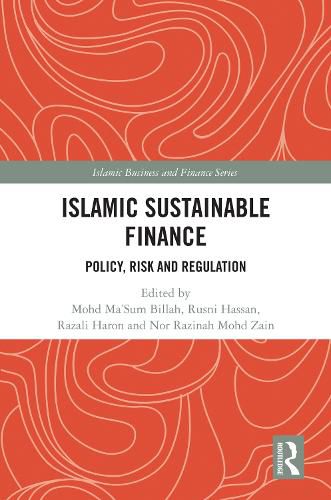Readings Newsletter
Become a Readings Member to make your shopping experience even easier.
Sign in or sign up for free!
You’re not far away from qualifying for FREE standard shipping within Australia
You’ve qualified for FREE standard shipping within Australia
The cart is loading…






The central idea of sustainability in the modern world is intricate and ever-changing. Closely related to the realm of finance and socioeconomic discussion, the phrase "sustainable impact finance" has become increasingly popular among bankers, practitioners, financial analysts, investors and the relevant experts seeking an impactful connection between the best financing mechanisms or tools and sustainable development related investments or projects.
This book opens up the discussion by offering a Shari'ah-compliance perspective. It is a primer on how Islam addresses and offers solutions to the challenges facing us within the spirit of maqasid al-Shari'ah, among others, in tackling poverty, food supply, health and well-being, quality education, reducing inequalities, responsible consumption and production and climate action. It discusses the connection between Islamic sustainable finance and the Sustainable Development Goals (SDGs) and explains the strategic action-plan of Islamic banks towards achieving Islamic sustainable finance.
The book considers the relevant policies and regulations, evaluating the role of regulators, discussing jurisprudential solutions and focusing on the role of Islamic banking standards in relation to Islamic sustainable finance. Further, it explores the issue of risk mitigation and the effective role of Takaful. It presents a practical case study from the banking industry in Malaysia, which evaluates the carbon footprint of bank loans and climate change risk mitigation. Finally, it highlights sustainable finance innovations in an Islamic concept.
The book will appeal to advanced students, researchers and scholars of Islamic banking and finance, as well as those concerned with environmental social governance and Sustainable Development Goals research. Regulators, policy makers and Shari'ah-compliant practitioners will also find it to be a useful guide.
$9.00 standard shipping within Australia
FREE standard shipping within Australia for orders over $100.00
Express & International shipping calculated at checkout
Stock availability can be subject to change without notice. We recommend calling the shop or contacting our online team to check availability of low stock items. Please see our Shopping Online page for more details.
The central idea of sustainability in the modern world is intricate and ever-changing. Closely related to the realm of finance and socioeconomic discussion, the phrase "sustainable impact finance" has become increasingly popular among bankers, practitioners, financial analysts, investors and the relevant experts seeking an impactful connection between the best financing mechanisms or tools and sustainable development related investments or projects.
This book opens up the discussion by offering a Shari'ah-compliance perspective. It is a primer on how Islam addresses and offers solutions to the challenges facing us within the spirit of maqasid al-Shari'ah, among others, in tackling poverty, food supply, health and well-being, quality education, reducing inequalities, responsible consumption and production and climate action. It discusses the connection between Islamic sustainable finance and the Sustainable Development Goals (SDGs) and explains the strategic action-plan of Islamic banks towards achieving Islamic sustainable finance.
The book considers the relevant policies and regulations, evaluating the role of regulators, discussing jurisprudential solutions and focusing on the role of Islamic banking standards in relation to Islamic sustainable finance. Further, it explores the issue of risk mitigation and the effective role of Takaful. It presents a practical case study from the banking industry in Malaysia, which evaluates the carbon footprint of bank loans and climate change risk mitigation. Finally, it highlights sustainable finance innovations in an Islamic concept.
The book will appeal to advanced students, researchers and scholars of Islamic banking and finance, as well as those concerned with environmental social governance and Sustainable Development Goals research. Regulators, policy makers and Shari'ah-compliant practitioners will also find it to be a useful guide.